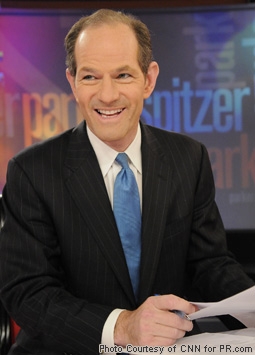
No matter what you think of Eliot Spitzer, few would debate the merits of his intellectual prowess or his dedication to justice for ordinary, hard working Americans. His ability to cut through bureaucracy and self-serving agendas orchestrated by a privileged few is uncanny. The result of these qualities was a groundswell of support from middle class and working class New Yorkers during Spitzer's tenure as New York State Attorney General, the position that ultimately helped him secure his post as New York's no-nonsense governor.
Born into a wealthy family and groomed in the Ivy League, Eliot Spitzer came out swinging against organized crime figures while working for the District Attorney's office early on in his legal career. It was that velocity that would have many people tout him as a tireless protector of the citizens of New York, while others would count him as an enemy and root for his eventual downfall.
After being elected New York State Attorney General in 1998 Spitzer focused on white collar crime, with securities fraud and price fixing scams in his permanent crosshairs. Eliot Spitzer continued to build upon his reputation as a tireless crusader to some, and a ruthless opportunist to others. Another one of Spitzer's targets were the predatory practices of unscrupulous mortgage lenders and an unregulated lending industry that would run amuck and ultimately lead our country into what has now been dubbed, the Great Recession. To Spitzer's credit, he saw our economic empire crumbling from miles away. His political and ethical sensibilities were ahead of their time. It is fair to say that he knew what we were up against long before the White House got wind of the damage, some six years later, when it was already too late. From his battles with the criminal underbelly of New York to uncovering shady dealings on Wall Street, plenty of people had it in for Eliot Spitzer, while many of his political peers silently envied his power.
Spitzer himself was quick to admit during our interview that his legal work both in the private sector and as New York's attorney general, left a trail of enemies in its wake, some of them "significantly influential people," he conceded.
After taking the governor's seat in 2007 Spitzer appeared to be dealing with the archetypal ups and downs and ego wrangling that comes with the position, but no one expected what was to come next. Suddenly the tables were turned and Spitzer was himself the subject of an investigation and scandal, forcing him to resign as governor of New York and to turn over his post to David Paterson. Spitzer, no doubt, would begin to re-examine his own personal choices, embarking on a period in his life that must have been excruciatingly dark for a man who always insisted upon exemplary behavior from others. In 2008 it appeared that Spitzer, with all of his political promise, had fallen from grace and people wondered how or if Eliot Spitzer would ever rebound. A phone call from CNN executives would answer that question.
The television network, looking for fresh blood for its 8 PM timeslot, decided to take a chance on one of the sharpest political and legal minds of our time, putting Spitzer squarely in front of primetime television viewers alongside Pulitzer Prize winning columnist Kathleen Parker on the new discussion roundtable program, Parker Spitzer. Now the question remains, can Eliot Spitzer be effective in his new role as on-camera pundit, commenting on those in political power from the sidelines? While some cynics are saying no, others would argue that CNN has awoken a sleeping giant. During my in-depth conversation with Eliot Spitzer, he weighs in on his own career prospects, his professional legacy and rising above what he refers to as the "yammering" of the gossip media.
PR.com (Allison Kugel): I have to get your take on an article that was just posted this morning. The article states, "WikiLeaks founder demands Obama's resignation over UN Espionage." Julian Assange is inferring that President Obama is solely to blame for our American diplomats apparently doing double duty as spies. What do you think about that?
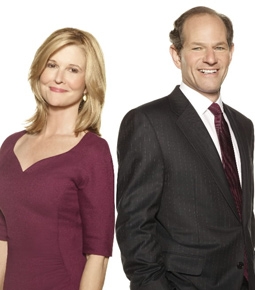
Eliot Spitzer: Whatever one thinks of the benefits to society in the long run of WikiLeaks' documents being out there, and obviously many people have different views of [Julian] Assange, for him to demand the President's resignation is kind of silly and frivolous on its face. I think the larger conversation is, what have we learned from these documents? How do they reflect on U.S. diplomacy, and what does it mean in the longer term in terms of our ability to conduct diplomacy within the appropriate code of silence, but also subject to the appropriate public scrutiny.
PR.com: Do you think that our rapidly advancing information age and the power of the Internet is going to increasingly put our national security and well being at risk, especially now with this new precedent set by WikiLeaks?
Eliot Spitzer: It cuts both ways. There are elements like these leaks which would obviously make diplomacy much more difficult. But the long run value of the openness and transparency to a democracy is also enormous. It is technology such as the Internet which brings pressure to bear on totalitarian regimes or autocratic regimes to become democratic in nature. China is struggling with this right now, desperately trying to control its population's access to information, and the Internet is what permits us as a democratic society to say to the citizens of China, "Look what you don't know and look what you should know." So technology changes many things. It makes diplomacy more difficult, but it also has led to the spread of democracy over the last hundred years; I don't mean just the Internet, obviously, but the printing press, the fax machine, all of these things have changed the world. So I think [some of it] has been enormously beneficial to us as a democratic society.
PR.com: Do you view Julian Assange as a criminal, and the Swiss company that is currently hosting his website as aiding and abetting a fugitive of justice, or is he someone who is expressing his First Amendment rights and his rights to use the Internet to share relevant information?
Eliot Spitzer: I'm going to defer to Eric Holder and the Department of Justice to make that decision at this point. I don't know enough about where he got the information, how he got it or from whom to determine whether or not he can or should be charged. Those are fact-based decisions that need to be made from specific information which I certainly have not seen, and frankly a lot of people are expressing views that aren't yet founded in those facts sufficiently. I'm going to wait to see what the Justice Department tells us. Then we'll certainly have a chance to weigh in on it. What we do know is what is in the documents, and that's why we've been talking about that a fair bit (referring to his nightly round table discussion program on CNN, "Parker Spitzer"). I think they've been a mixed bag. There is a mixed storyline which has shown U.S. diplomacy to be effective, smart, wise, struggling with many difficult, probably impossible situations but doing a very good job under the circumstances.
PR.com: Back in 2008 could you have seen yourself stepping back into the public eye on a nightly television show?
Eliot Spitzer: I probably wouldn't have predicted this, but it is certainly a welcome opportunity. It has been great fun, and I think we've gotten a lot of viewers who are enjoying the show and enjoying what we are trying to do, which is to create a show where a bunch of different perspectives can be aired without any one position being the dominant or exclusive voice to be heard.
PR.com: CNN approached you and they said, Eliot we want you to headline a primetime talk program for our network because...
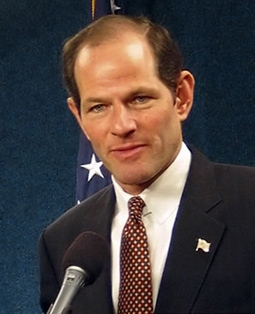
Eliot Spitzer: (Laughs.) You would have to ask them that. I don't know what their rationale was. When they came to me, I said, "Ok, I'm game for it." Why they wanted to do it, only they can answer. Obviously, the network is interested in creating informative, interesting programming. Eight o'clock is an hour where you've got Keith [Olbermann] who does a very good job on the other side with one perspective and you've got Bill O'Reilly who has another perspective. What we're trying to do is to create an opportunity for both views to be heard with vigorous debate and inquisitive questioning so that people learn and leave the program not just having their pre-existing views re-enforced, but having felt something educational is happening.
PR.com: Our House and our Senate are becoming increasingly partisan. Now it seems as if our television programming has become that way as well. We have the red states watching Fox News and we have the blue states watching people like you. How are viewers supposed to determine the unbiased facts?
Eliot Spitzer: Well that's what we're trying to do. I think it's useful when we can bring a conservative republican congressman on to the show who will have certain views that I may differ with, but I can ask him questions that will force him to justify and confront facts that may not be part of his talking points. And likewise, when we bring on folks who are more liberal, Kathleen examines them more vigorously, or I do the same thing. Having been a trial lawyer you learn the power of examining a witness and the power of cross examination. It is that intention, when hard questions are asked, that gets to the truth. That is what we're trying to do.
PR.com: What is your response to critics of Parker Spitzer who are saying that Kathleen Parker is CNN's token pseudo-conservative and that she is struggling to find her voice and get her footing on the show alongside your outspoken personality?
Eliot Spitzer: I certainly don't agree with it, but you can't silence critics, nor do you ever try to. People are entitled to their views.
PR.com: What is Kathleen's position? Would she agree with that criticism of the show's dynamic?
Eliot Spitzer: Kathleen's voice is powerful and is heard, as it should be, and she is an effective questioner. I think people have to appreciate that.
PR.com: How effective do you feel in your role on Parker Spitzer as far as your ability to make a difference in the political and economic landscape? Are you frustrated operating outside of politics?
Eliot Spitzer: It's a different role. When you're in the arena, as they say, it's one thing. When you're in the media you play a different role and you learn to enjoy and appreciate each one, and just do what you can do to use an hour of primetime TV, five nights a week, to try to educate and frame issues and make sure the public understands what the choices are that we're making.
PR.com: What have you learned now that you've been on both sides of the fence? Have you had a moment where you've said, "Now I understand why the media treated me a certain way while I was in office," as an example?
Eliot Spitzer: I think what I've learned is that when you're on one side you always want to be on the other (laughs). It always looks better on the other side. The grass is always greener, as the cliché goes. You certainly appreciate the role that you're filling and try to do your best at it. The role now is to educate, to push, to probe, to ask questions and to try to get information in front of the public so that people can make informed judgments.
PR.com: What is your opinion of your successor, Governor Paterson?
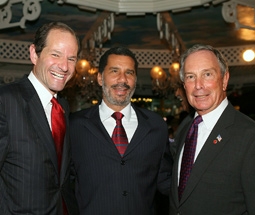
Eliot Spitzer: I have not been in the business of passing judgment on David. Too many others have done that. I have spoken to him and will continue to speak to him to give him whatever advice he asks for, in private. I think it would be wrong for me, in public, to start passing judgment.
PR.com: Did you go through a period where you mourned the fact that you were no longer governor of New York?
Eliot Spitzer: I'm not sure I would talk about mourning. You mourn people, you mourn more serious things than your professional life.
PR.com: You were a crusader, and I think many people feel that there isn't enough of that in politics.
Eliot Spitzer: I think it would be great if we got more people into the political arena who were willing to challenge the status quo in a more vigorous way. That is very much what we need, that is what I have written about and that's what I try to get the show to focus on a fair bit. That's what I tried to do when I was attorney general and governor. I would like to see more of that. I think the frustration I do have with politics at the moment is that we seem to have lapsed back into very much a status quo mentality...
PR.com: Including President Obama's approach. Is that a fair statement?
Eliot Spitzer: To the extent I've been critical, and I try hard not to be too critical of the president, but I have observed that the financial reform measures are not nearly significant enough in my view to counteract the structural problems we've got in finance and in our job creation sectors.
PR.com: Back when you were attorney general for the state of New York your life's work was cleaning up a lot of fraudulent practices in mortgage lending and cleaning up Wall Street. That being said, had you been in President George W. Bush's shoes in 2008, would you have chosen to bail out the banks?
Eliot Spitzer: I think the question isn't whether the banks needed to be saved in one form or another. The question is what we created afterwards. My criticism, and I have been rather clear about this and rather harsh in my criticism, is the way the bailouts were done. The meaningful option was not to let them all go bankrupt. That would have led to a depression; that would have led to an economic cataclysm. The questions were, who paid for it, and what reform did we get afterward? Who paid for it? That's a question of the bonuses and the compensation structure, and the fact that we left those who would extract any ill-gotten gains from the banks over many years, we led them to hold on to those gains. There should have been a clawback, and there should have been a limitation on bonuses. AIG, a check for 12.9 billion dollars which was essentially equal to their profits that year, they then turned around and gave away in bonuses. That was all taxpayer money. [And] we did not put in place meaningful reform in terms of "too big to fail," in terms of these subsidies that these major banks continue to get, and in terms of taking apart the inherent conflicts of interest in the multiple roles they play. That is where much more could have been done and perhaps can still be done, although I'm getting less confident about that.
PR.com: You personally blog on the Parker Spitzer CNN blog page, and you've posted some rather disturbing statistics lately including last week's news that two million Americans simultaneously lost their unemployment insurance benefits. These kinds of statistics make many of us feel somewhat helpless in the situation. So we see that large number, and now what?
Eliot Spitzer: Part of the process is getting the issues heard and getting the conversation going. My guess, and certainly the rumblings out of Washington, sort of the obvious compromise, will be that they will extend the tax cuts and also continue unemployment insurance. I think it's too bad. The unemployment insurance obviously should be extended, but extending the tax cuts for everybody is simply bad economics and bad politics as far as I'm concerned. But that seems to be the compromise that will be [worked out]. So unemployment insurance at least will move forward, but none of this is being done the right way.
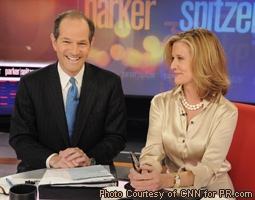
PR.com: How do you create new significant jobs, jobs that will last and flourish, if you don't create new infrastructure?
Eliot Spitzer: The infrastructure is what we should be investing in. But infrastructure investment is very different than tax cuts for the wealthy. What I have pushed for, you could do everything from a payroll cut, you can do an infrastructure bank, you could do smart research and development expenditures. All of those are hugely important, but the dollars we are giving away on the tax cut for the wealthy has been proven not to be job creative. And those are the very dollars that we could be spending on alternative uses such as infrastructure investment.
PR.com: Is Parker Spitzer live or pre-taped?
Eliot Spitzer: We do both. Some nights we're live and some nights we tape; it depends on guests. There is a guest today who can only do it at 3:30, so we're taping that at 3:30. We will do what we can and must do to get the right guests. We taped Senator Lindsey Graham at noon on Friday. He was heading out to get an airplane, but we got a great interview that I thought was fascinating. He said we should have permanent military establishments in Afghanistan, and when he said "permanent," I said "I must be mishearing. You want us to be there forever?" And he said, "Yes, in perpetuity." It's kind of crazy. So you do it whenever you can get the right guest.
PR.com: Being that Kathleen Parker is the conservative and you're the liberal, how do you strategize before each show to be sure that each of your positions are clear and you don't trample over each other on the air?
Eliot Spitzer: We talk a lot before the interviews about how we are going to do it and who is going to talk about what. You would assume that any co-hosts would do that just to make it a rational conversation.
PR.com: Kathleen seems to be enduring a lot of criticism from the media regarding your show, and I can't figure out if it is because her background originally in print journalism, or what the reason may be?
Eliot Spitzer: This may surprise you, but I don't read what the critics say. When you are in politics as long as I was, you do what you think is right, I read the news and I try to understand what's going on in the world, but a lot of the yammering about passing judgments on what I'm doing or about Kathleen, frankly I don't read it or pay much attention to it.
PR.com: On March 10th of 2008 when the New York Times had exposed your personal indiscretions your political career was derailed, at least temporarily. The day before, on March 9th of 2008, were you thinking in terms of an eventual run for president of the United States?
Eliot Spitzer: The only thing that I ever thought about when I was in office was doing the best job I could for the people that put me in office. The only thing I can tell you about the issue of running for the White House is what I've said over and over again, which is that my views and what I stood for I always believed were not views that would ever permit somebody to successfully run for the White House. I never thought about it, I never structured or did anything with that intention or expectation. My job was always to do the best job I could as attorney general and as governor.
PR.com: You seem like someone who is not afraid to be disliked by the brass, by the political establishment, the corporations, the lobbyists. It appeared that you stood for justice at any cost.
Eliot Spitzer: Everybody else thinks they are doing the right thing, so I'm not going to impugn their motives or their views. I always, obviously, tried to do what I thought was right and I ended up leaving a fair bit of discomfort, and people didn't necessarily like me in the wake of all that, some of them significantly influential people, but so be it. That was the small downside, perhaps, to the very big upside of having positions that let me do things that were right.
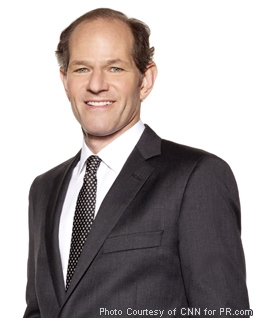
PR.com: Do you think you would ever be accepted back into the political fold, and do you want to be?
Eliot Spitzer: It's not something I think about or worry about. My job now is to do the best TV show I can and CNN has given me a great opportunity. I want to do the best for the show, the best for CNN and that's what we're trying to do?
PR.com: What are your thoughts on Mayor Bloomberg hiring Cathleen Black as chancellor of New York City schools?
Eliot Spitzer: I wish her well now that she has the position. I think that she has a steep learning curve and I think she's got to dig in to a whole slew of tough and substantive issues relating to education ideology as well as to understanding an organization that is very big and cumbersome. There's a steep learning curve, but I wish her all the best because the fate of many New York City school kids depends upon her success.
PR.com: I believe it was you who stated on Parker Spitzer, "The republicans in the Senate are holding our country's progress hostage."
Eliot Spitzer: Yes.
PR.com: Ok, so I am quoting you properly (laughs).
Eliot Spitzer: (Laughs.) In fact, somebody sent me something; Jacob Weisberg had a Tweet where his words were simplified calling it "the rich are holding the poor hostage." Without embracing his precise articulation of it, the Republican Party is very clearly holding hostage the many critical issues that should not be held hostage, like their effort to give the rich another tax break; everything from the Star Treaty to Don't Ask Don't Tell to the unemployment insurance issue. It's just mystifying that we would let them do this.
PR.com: I understand where you're coming from and I agree with you on certain points. However, could it be argued that they're simply asserting their views and their right to enforce government checks and balances, or do you believe there is sinister intent in the action of republicans in the Senate?
Eliot Spitzer: I'm not challenging motive and I'm not saying they don't have the right pursuant to Senate rules to do it. It's just an observation that is a reality that what they are doing is keeping a much larger agenda that is necessary and important for the country, they are holding it hostage to one issue where I happen to think they are wrong on the substance and wrong on the equities.
"Parker Spitzer" airs weeknights at 8 PM EST on CNN. Visit Eliot Spitzer's CNN blog at parkerspitzer.blogs.cnn.com and follow him on Twitter @parkerspitzer.
